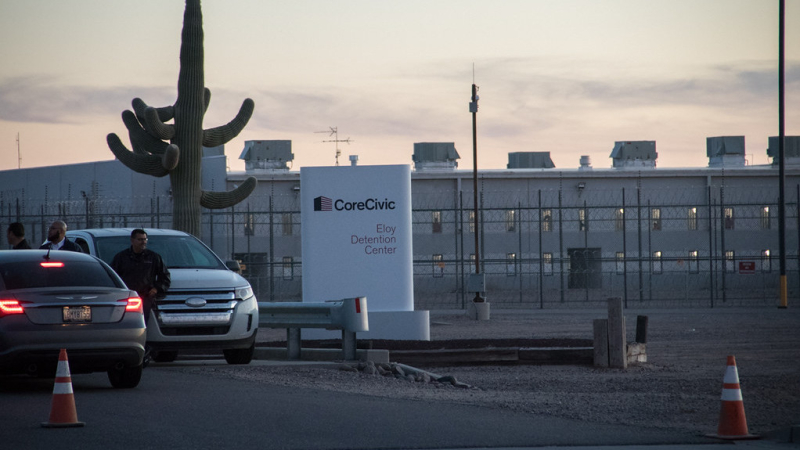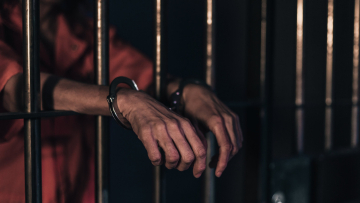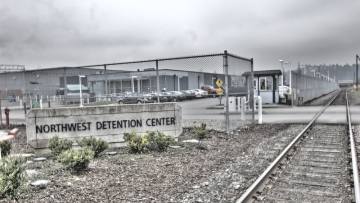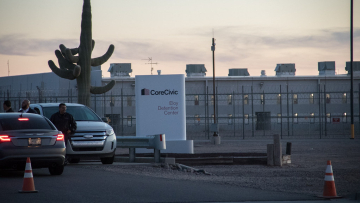
Company – Target
This profile is a priority campaign targetBankTrack

Company – Target
This profile is a priority campaign targetBankTrack
Why this profile?
CoreCivic profits from the incarceration of migrants and their use as a source of cheap labour. Since President Trump returned to office, his administration’s aggressive immigration enforcement policies have led to a significant rise in incarceration rates within private prisons across the United States. Detainees, including migrants, asylum seekers, and sometimes families with children, often face rights abuses, like poor living conditions and exploitative labour practices.
What must happen
Given the well-known and protracted nature of the human rights violations at CoreCivic’s facilities, banks and other financial institutions should stop financing CoreCivic and divest of holdings in the company that they own or manage, including nominee shareholdings and shares invested in index funds.
| Sectors | Prisons and Immigration Detention |
| Headquarters |
|
| Ownership |
listed on NYSE
CoreCivic's largest shareholders are the Vanguard Group and FMR. A full overview of the company's shareholder structure can be accessed here. |
| Subsidiaries |
|
| Website | https://www.corecivic.com/ |
CoreCivic, formerly the Corrections Corporation of America and established in 1983, is a US company that owns and operates private prisons and immigration detention centres. Headquartered in Nashville, Tennessee, the company is one of the largest private prison companies in the United States. CoreCivic owns or manages more than eighty state and federal correctional and detention facilities.
Impact on human rights and communities
Mistreatment of detained persons CoreCivic, together with the GEO Group, is one of the major managers of Immigration and Customs Enforcement (ICE) detention centres. These companies have been described as relying "on a business model based on forced labour" and are linked to evidence of inhumane conditions, abuse and death at their facilities
The Department of Homeland Security Office of Inspector General, an independent watchdog agency that oversees ICE, issued a damning 2019 report documenting widespread abuse at ICE detention centres. It found “immediate risks and egregious violations of detention standards”, including “overly restrictive segregation, inadequate medical care, unreported security incidents, and significant food safety issues”. Between 2020 and 2023, the same federal watchdog conducted a review of 17 ICE facilities and identified ongoing, widespread violations of medical, safety and environmental standards, highlighting systemic failures that persisted despite earlier findings. A 2018 study found that for-profit detention facilities generate 175% more grievances than government-run facilities. Private prison companies have perverse incentives to make business decisions that negatively impact people being detained, for example as cost-cutting measures often affect the mental and physical health and safety of detainees.
Forced labour Detainees at CoreCivic’s facilities are forced to work for $1 or less per day, often under threat of punishment or loss of privileges. Tasks detainees are forced to perform include washing laundry, preparing and serving meals, performing clerical work, providing barber services, and other activities. Some detainees claim they are often not given adequate training or safety equipment. These allegations have repeatedly been raised with the company throughout the years, and in numerous instances lawsuits were filed. These lawsuits show the extent of the human rights abuses perpetrated by CoreCivic under its so-called “voluntary work programs”; for example, detainees who decline to work extra hours, refuse to work while being unwell, or voice concerns about unsafe working conditions, risk being placed in solitary confinement, lose family visitation privileges, or even face legal charges. CoreCivic hugely benefits from this system of cheap, and often free, labour, which saves the company millions of dollars per year.
Deaths at detention centres Cost-cutting measures at for-profit detention centres can result in inadequate medical care, understaffing, and inadequate training for staff, all of which can contribute to an increased risk of deaths among detainees. Between October 2003 and February 2018, 179 detainees died in ICE custody, 15 of which were held at CoreCivic’s Eloy Federal Contract Facility in Arizona. More recently, in 2021 an investigation into the 2018 suicide of Efraín Romero de la Rosa, who was held at CoreCivic’s Stewart Detention Center in Georgia, reportedly the deadliest immigration center in the US, revealed that the company’s personnel had falsified records, inappropriately placed de la Rosa in disciplinary solitary confinement, and failed to adhere to appropriate protocols for mental healthcare.
In 2022 advocates started calling for closure of CoreCivic’s troubled Torrance County facility, where detention conditions are some of the worst in the country. This followed the death of a number of inmates, including a Brazilian asylum seeker who committed suicide as a result of continued mistreatment and abuse.
Family detention and separation of children from their parents The Immigration and Customs Enforcement (ICE) contracts with several facilities to detain families with children. Two such facilities are maintained across the United States, both are in Texas. The South Texas Family Residential Center is run by CoreCivic and is the ICE’s largest immigrant jail, with a capacity to hold 2,556 people. The Center has held families and small children in appalling conditions, often in overcrowded quarters and with poor health and medical care. This is evidenced in a lawsuit filed by the mother of a toddler who died from a “preventable and treatable illness” after CoreCivic failed to provide standard medical care. The facility was closed in 2024 under the Biden administration, but was reopened in 2025 under the Trump administration’s renewed focus on family detention through a 246 US million dollar contract to CoreCivic.
In addition, a policy of “zero tolerance” for illegal entry to the United States, passed in 2018, resulted in over 3,800 children being separated from their parents at the border. Many of these children were held at CoreCivic’s facilities. CoreCivic provided false information about its role in family separations, and tried to hide this with a lawsuit. This was dismissed in 2020, finding that the company “did, in fact, operate detention facilities for parents separated from their children.”
Other impacts
Rioting and hunger strikes Detainees at CoreCivic facilities often protest against forced labour and poor living conditions. For example, in October 2022, asylum seekers held at CoreCivic’s Torrance County Detention went on a hunger strike to protest “inhumane” conditions, including “mold growing in the bathroom, raw food, fungal infections on men’s heads due to unsanitary barber tools and an excessive amount of flies and mosquitoes.” A lawsuit later revealed that protests at Torrance County were repressed with violence. In another instance, inmates at CoreCivic’s La Palma Correctional Center and the Red Rock Correctional Center in Arizona protested following CoreCivic’s inaction to address a prolonged power outage, which had greatly impacted living conditions. Numerous riots and hunger strikes also took place during the COVID-19 pandemic in response to CoreCivic’s inadequate measures which put the lives of many detainees in danger. Strikes broke out in CoreCivic’s facilities in California, Georgia, Florida, New Jersey and Ohio.
Profiteering from detainees Detainees at GEO Group and Core Civic facilities are charged for all kinds of services and have to use for-profit money transfers, like Western Union or Global Tel Link, to pay for them. Phone companies can charge prisoners as much as USD 25 for a 15-minute phone call. Health care, ankle monitoring, drug testing and food services are outsourced to companies through lucrative contracts.
Lobbying CoreCivic spent over USD 30 million between 2000 and 2023 to lobby the US Congress and federal agencies. From 2019 to 2021, it lobbied the Office of the Comptroller of the Currency (OCC), which oversees federal banks, in response to the OCC’s proposed “Fair Access to Financial Services” rule - intended to prevent banks from refusing services to politically controversial industries, including private prison corporations. The rule was put on hold in 2021. In more recent years, lobbying activity has intensified: in 2024 alone, CoreCivic spent US 1.77 million lobbying the federal government, largely focused on the Department of Homeland Security appropriations bill, which includes ICE funding. CoreCivic also ramped up its political spending, contributing half a million US dollars to Trump’s 2025 inaugural committee, twice the amount it gave in 2017.
Lawsuits Throughout the years, CoreCivic has faced numerous lawsuits relating to human rights issues. A few recent examples include:
- In April 2025, a federal jury awarded US 27.8 million dollars to Nathaniel Lake, a former inmate who was severely beaten at CoreCivic’s Crossroads Correctional Center in Shelby, Montana. The jury found CoreCivic liable for failing to protect Lake from the assault.
- In 2024, CoreCivic settled over US 4.4 million dollars in claims alleging mistreatment, including at least 22 inmate deaths, in its Tennessee prisons and jails since 2016. The largest settlements involved the Trousdale Turner Correctional Center, now under federal investigation for reports of violence, medical neglect, and severe understaffing
- In February 2023, the immigrant justice group Al Otro Lado filed a wrongful death lawsuit against CoreCivic concerning Anthony Jones, a Bahamian man who died of a heart attack at the Adams County Detention Center in Mississippi in December 2020. The suit alleges that staff failed to send him to the hospital and waited at least nine minutes before administering CPR.
- A 2020 lawsuit by four people incarcerated at aCoreCivicprison in Colorado alleged they were forced to work for 42 cents per day, with refusal resulting in punishments like tloss of visitation or commissary access. Five similar lawsuits alleging forced labour in CoreCivic’s facilities were filed between 2017 and 2018 (Owino v. CoreCivic and Gonzales v. CoreCivic in 2017 in California; Barrientos v. CoreCivic, Ndambi v. CoreCivic, and Martha Gonzales v. CoreCivic in 2018 in Georgia, New Mexico, and Texas, respectively).
As of May 2023, twelve banks, including JPMorgan Chase, Morgan Stanley, UBS, BNP Paribas, Goldman Sachs, Swiss National Bank, HSBC, Barclays and Credit Suisse, had substantial share holdings in CoreCivic. See below for more details on banks involved.
Since Election Day in 2024, CoreCivic’s stock has surged by nearly 30%, increasing the value of holdings for banks maintaining positions in the company, whether through active investments or passive index funds.
In 2019, eight banks announced they would cease new lending to private prisons and detention centres operators. These include Bank of America, Barclays, BNP Paribas, Fifth Third Bank, JPMorgan Chase, Truist Bank, US Bank and Wells Fargo.
Before those announcements, ten banks, including Bank of America, Fifth Third Bank, HSBC, JPMorgan Chase, Macquarie, PNC Bank, Regions Bank, Truist Bank, had financed CoreCivic through:
-
a USD 800 million credit facility in April 2018, maturing in April 2023 (sec.gov);
-
and a USD 200 million corporate loan made in April 2018 and maturing April 2023 (sec.gov). See below for more details.
Despite earlier commitments, some banks, notably Bank of America and Wells Fargo, have walked back their 2019 pledges, reopening the door to new credit facilities to private prison operators like CoreCivic, in certain cases.
In contrast, several investors have chosen to divest. Danish pension funds PKA and Lærernes Pension removed CoreCivic from their portfolios in 2019, followed by PSP, Canada's largest pension fund, which fully divested in 2021. KLP, the Norwegian pension fund, also excluded CoreCivic from its portfolios in 2022, citing human rights concerns. More recently, in 2024, commercial banks like ANZ, Nordea and Danske Bank added CoreCivic to their investments exclusion lists. Here are more investors that have excluded CoreCivic from investments.





